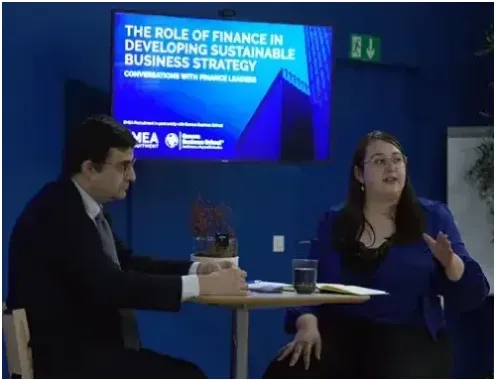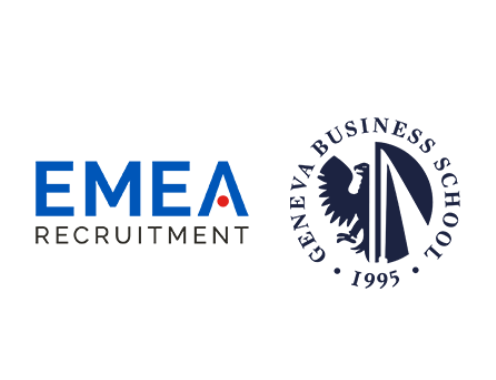The Role of Finance in Developing Sustainable Business Strategy – Oriane Minger & Dr. Ilidio Silva


The EMEA Recruitment podcast is proud to present a limited series in collaboration with Geneva Business School. Conversations with Finance Leaders will bring you the tangible experiences of specialist professionals with the expertise of the Business School’s leading academics.
In the inaugural episode, Director John Bower welcomes Oriane Minger, Carbon Finance Manager at SCB Group, and Dr. Ilidio Silva, Professor of Finance Accounting and Sustainability at Geneva Business School, to discuss the role of Finance in developing sustainable business strategy.
Please note: This conversation was recorded at the Geneva campus, which may cause some background noise and variations in sound quality.
To begin, Oriane introduces SCB Group, an international B Corp company headquartered in Switzerland, which is guided by one mission: to build and promote a low-carbon future. She details the company’s evolution, carbon initiatives, achievements, and her advisory role within the business, involving daily discussions on a range of Environmental, Social, and Governance (ESG) topics.
Dr. Silva reflects on the role of CFOs, referencing Deloitte’s article, The CFO as the Driver of Sustainability, which argues that CFOs act as catalysts, stewards and operators for promoting sustainability. They possess the necessary toolkit to align ESG goals with the company’s profitability, supported by strong organizational networks and in-depth expertise in data, processes and reporting, he explains.
Oriane suggests starting with greenhouse gas (GHG) accounting, a methodology structured in three scopes. By combining Scope 1, which covers emissions from sources owned or controlled by a company (e.g. offices and company vehicles), and Scope 2, indirect emissions from purchased energy (e.g. electricity for the office and company vehicles), you can obtain a clear picture of what you can control and prioritize actions more easily.
Scope 3 is more challenging, as it requires data and an assessment of the company’s entire value chain. Oriane recommends collaborating with a partner, as GHG accounting is very broad. She advises assessing your current data accessibility and working closely with your CFO and Accounting teams. Focus on prioritization, bring the right people to the table, and seek support where needed, she says.
The conversation shifts to carbon credits. A carbon credit represents a verified emission reduction - one ton of CO2 equivalent that has been avoided, reused or removed from the atmosphere. Oriane cites SCB’s community projects in Nepal as an example of reducing and avoiding emissions.
SCB Group identifies carbon credits by conducting due diligence on client projects. They work with reputable registries, ensuring projects are thoroughly tracked and results are publicly available. SCB also partners with trusted project developers and methodologies.
In general, regulations are affecting an increasing number of organizations. Dr. Ilidio reiterates that now is the time for companies to embrace sustainability, provide training, and hire professionals with sustainability competencies.
LinkedIn’s 2023 global skills report stated that one in eight workers had green skills. However, in Finance, only one in 15 had green skills, showing room for improvement. Additionally, the fastest growing skills in the EU included climate action planning (increasing by 152%), carbon emission accounting (by 131%), and carbon accounting (by 130%).
To end the conversation, Oriane discusses her career journey in further detail. Originally, Oriane worked in Finance for seven years, before transitioning to sustainability out of interest and the demand for skills in the area. She then offers examples of similar methodologies and transferable skills between the functions. Upon entering the sector, stay curious, gather the skills, and bring the conversation to your company, she adds.
The episode then enters a live Q&A session.
The first question was addressed by Oriane, who explained that Scope 3 is a key topic in all current internal and external discussions.
The conversation then shifted to how CFOs and Finance Directors, who prioritize the bottom line, perceive sustainability investments. An audience member asked whether these investments are viewed as costs. Oriane explained that it largely depends on the customer and organization. Companies that take proactive steps to address costs and implement sustainable processes now will benefit in the long term, both operationally and financially. Additionally, prepared companies are more likely to attract like-minded customers.
Dr. Silva added that CFOs can be convinced to invest in sustainability by emphasizing its long-term financial benefits, such as attracting and retaining top talent.
The topic of regulations followed, with specific mention of the Corporate Sustainability Reporting Directive (CSRD) and the challenges of navigating it. Some industries and companies are also subject to the EU Emissions Trading System (EU ETS), which mandates compliance-related payments.
In terms of setting up KPIs to prioritize sustainability initiatives, the speakers suggest working on KPIs that make sense for your business. For example, targeting suppliers and materials with higher climate risks or impacts could be a starting point. Companies should develop plans to access relevant data and maintain consistent methodologies over time, as inconsistencies can undermine data comparability. KPIs can also include actionable measures, such as modifying supplier contracts, to capture data and track progress.
Education was a question that was also raised. Sustainability can be taught across various professions, and schools that incorporate it into their curricula help unlock diverse perspectives. These perspectives enable individuals to develop stronger ethics and become well-rounded professionals, they explain.
When discussing sustainability in developing countries, the conversation acknowledged that while the core issues are similar, the means of addressing them differ. The focus should be on shifting mindsets and adapting behaviors to reduce emissions.
AI’s role in sustainability was also explored. At SCB, for instance, a visionary CEO is driving the development of proprietary tools to improve data quality. AI can automate data cleaning, provide accurate estimates, and adjust metrics, offering valuable insights that support sustainability goals.
Taking a broader perspective is crucial in GHG accounting, which considers seven gases - not just carbon. While carbon is often the most accessible starting point, the topic grows increasingly complex and evolves constantly as companies delve deeper.
For those aspiring to enter ESG Finance, the panel recommended acquiring relevant skills as soon as possible.
Finally, the discussion turned to sustainability reporting, which can encompass a wide range of areas. For example, SCB reports on Diversity & Inclusion policies, equal pay initiatives, biodiversity goals, governance measures, and safeguarding actions. Reporting priorities vary depending on the company, which often collaborates with partners to focus on short, mid and long-term goals.
Watch the full episode below or search for the EMEA Recruitment podcast on your preferred app:
You can also listen below:
Or find the full episode at this link: https://emearecruitment.libsyn.com/website/category/emea-recruitment-podcast-168-the-role-of-finance-in-developing-sustainable-business-strategy-oriane-minger-dr-ilidio-silva
To find the part of the episode most interesting to you, please use the timestamps below:
03:30: An introduction to SCB Group & Oriane’s role
05:30: The role of the CFO as a driver of sustainability
08:40: How to achieve net-zero emissions
12:35: Common difficulties
14:00: What are carbon credits?
21:15: The future of sustainability-related professions
24:40: Advice for those looking to enter sustainability in Finance
27:45: End of part 1
28:20: Live audience Q&A:
28:40 How many of SCB’s clients are focusing on Scope 3?
29:35 Do CFOs & Finance Directors who focus on the bottom line view their investment tools as a cost?
32:35: The main drivers of sustainability strategies & regulations
35:50 How sustainability can be taught in business schools
39:50: Defining green skills
41:00: Sustainability & its effects on developing countries
43:20 Setting up reporting tools & KPIs
45:20: How seriously are companies taking the challenges surrounding sustainability?
46:05: Regulations regarding vessels in the EU
46:50: How is AI being used for sustainability issues?
48:35: Should sustainability measurement be conducted outside of carbon?
50:00: Which ESG skills will be needed, and how can students position themselves effectively?
51:35: Other sustainability metrics outside of Finance
EMEA Recruitment is proud to partner with Operation Smile. To learn more about their vital work around the world or to donate to the cause, please visit: https://www.operationsmile.org.uk/partners/emea-recruitment/
If there are any topics you’d like us to cover in future episodes, please reach out to [email protected]






You can also use your social account to sign in. First you need to:
Accept Terms & Conditions And Privacy Policy